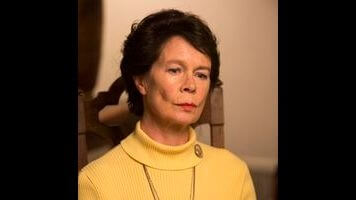Lenny Kravitz stops by Better Things for a little racism

Before we get started talking about “Brown,” let’s discuss how great David Duchovny is at lampooning fame. He was already a stand out on The Larry Sanders Show, and he’s only in “Brown” for a few minutes but he’s the funniest part of the episode, and while that doesn’t make him the best part of the episode — those watching Better Things know that belly laughs aren’t really the goal — but his brief appearance is so great (“I know it doesn’t match, but continuity’s for pussies.”) and informs quite a bit about Sam’s professional life and the rest of the episode. Let’s get this guy in an Episodes-style comedy already.
“Brown” was a solid episode that didn’t feel as cohesive as the previous two, but examines a couple of tough subjects without feeling heavy-handed. At first, I thought the episode’s two major setpieces — between Sunny (Orange Is The New Black’s Alysia Reiner) and her shithead husband, and the dinner scene where Phil reveals, or really revels in the fact that, she’s a racist — had little to do with each other. But as I thought about the episode, a luxury I’m given with the benefit of screeners, the connection became clearer. Sunny is the family that Sam has chosen, Phil is the family that Sam was given. Both are intrinsic to the way Sam lives her life, and both are equally important.
When Sam shoots Jeff down by telling him about how he essentially sucked the life out this vivacious woman who took Sam in when she was homeless, she’s telling Jeff that Sunny chose him, and retains him, but that does not mean Sam needs to do the same thing. It’s scenes like the one between Sam and Jeff that make it so difficult to call Better Things a comedy, especially when a scene like that is a diametrically opposed to the simple comic opening where we can all gather to laugh at Duchovny’s idiotic leading man. It’s a brutally honest scene between a woman who is fiercely protective of her best friend, and the asshole who said best friend can’t get rid of. It’s only sadder when Sam says this is not the first time this has happened. She told him five years ago that he was shithead, and he doesn’t even remember. It doesn’t affect her, and it certainly doesn’t affect him. Instead, it’s Sunny — the family she has chosen — that matters the most.
The family she hasn’t chosen is Phil, who decides to welcome director Mel (Lenny Kravitz) to dinner with a racist story about pantyhose that does not bear repeating. She’s a woman over 70, Mel chastises Sam, you need to tell her when you bring a black man home for dinner. These scenes bring up the casual aggression that people of color face on a regular basis that white people have the luxury of never dealing with at all. What Sam sees as Phil just being weird and making her guests uncomfortable, Mel sees for what it really is, that he’s not as welcome in the Fox house as Sam thinks he is. They can laugh off the situation and deal with it, but that doesn’t it’s not such a regular occurrence that he doesn’t see Phil’s reaction coming as soon as walks into the room. Celia Imrie’s Phil so perfectly narcissistic in the way she relays her pantyhose story, fully believing that she was in right the using nomenclature that she already knew was not okay, but decided to go with regardless. Imrie delivers the monologue with such purse-lipped self satisfaction, reveling in how awful her character is, instead finding joy in her haughtiness.
There are two other smaller points that have emerged as themes in Better Things that felt fully formed in “Brown.” The first is that a woman over 40 with children is still desirable sexually and a big deal does not need to made of this fact. Mel is attracted to Sam, Sam is attracted to Mel and that is a simple fact, rather than a major plot point. Sam and Mel’s relationship also reveals something about the working actor lifestyle. Pamela Adlon is not struggling financially — a decade voicing a cartoon character that’s now seen in syndication has to help pay the bills — but she’s still not an A-list star. The same can be said for Sam who lives in a nice house, supports three children by herself, and is seen doing both bit parts and voice work. Better Things treats her career for what it is: It’s a job. That means she’s sometimes stuck selling out, playing the parts she doesn’t want to play, or saying lines she doesn’t want to read (like in the pilot). And it also means her daughters don’t see her as an artist. They need to Mel to tell them that what she does is art, even if it feels more workaday then, says, what Brando would say he did. And perhaps his insistence that what Sam does is the sexiest thing about him.